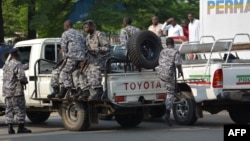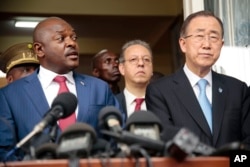The Burundian government says it welcomes the adoption of U.N. Security Council Resolution 2279, which calls for the deployment of a U.N. police contingent to monitor the security situation in Burundi.
The resolution passed Friday also calls on all parties to reject any kind of violence and public statements inciting hatred. It urges the Burundian government to guarantee fundamental freedoms for all and adhere to the rule of law.
Burundian Foreign Minister Alain Nyamitwe said President Pierre Nkurunziza’s government has always been open to an international presence in Burundi and would welcome the deployment of a U.N. police contingent as long as they are not U.N. troops.
“I think that what the resolution is talking about is not a police force but a police contribution. And we think that it is not exactly against the interest of the Republic of Burundi because what we are opposed to is the idea of troops. But we have always said that we are open for an international presence, which by the way is materialized by the presence of AU [African Union] human rights monitors and AU military experts,” he said.
Many fled Burundi
Over a quarter of a million Burundians have already fled the country since April 2015 in fear for their lives, and countless more have been internally displaced. The opposition claims President Nkurunziza, in office since 2005, violated previous accords in the way his latest election victory was conducted.
The Security Council noted what it called the ongoing repression, harassment and violence against the legitimate political opposition, the closure of free and impartial media, and widespread impunity for human rights violations and abuses – including those involving killings and alleged sexual violence by security services against political opponents and members of civil society.
Nyamitwe cautioned those he said are quick to indict the government about human rights abuses.
“I always say that it is easier to indict, it is easy to accuse without any form of investigation. Now that we are about the U.N. High Commission for Human Rights coming to Burundi to look into all those allegations, let’s wait. Why should we accuse the government on the basis of heresy or what NGOs talk without the due processes,” Nyamitwe said.
The U.N. Security Council resolution also urged the government and all other stakeholders committed to a peaceful solution to cooperate fully with the East African Community-led, African Union-endorsed mediator and facilitator, former Tanzanian president Benjamin Mkapa in his efforts to move the process forward
Nyamitwe said, “As far as we are concerned, we as a government have done our best. We have catered for the Burundian, at least those who are inside the country to engage in dialogue. Now, if we need to talk about dialogue outside the country, we have said that we have no opposition to that principle. What we have to work on is the list of participants and the topics to be discussed."
Government displeased with opposition representation
The Burundian government had said in the past it was not pleased with the choice of the National Council for the Restoration of the Arusha Accord, also known as CNARED to represent all opposition parties to the talks.
The government accused CNARED of being involved in seeking to overthrow the government.
The opposition has said it is in favor of a peaceful resolution of the Burundi conflict. It has accused President Nkurunziza of constantly creating roadblocks because it said he doesn’t want to negotiate with the opposition.






